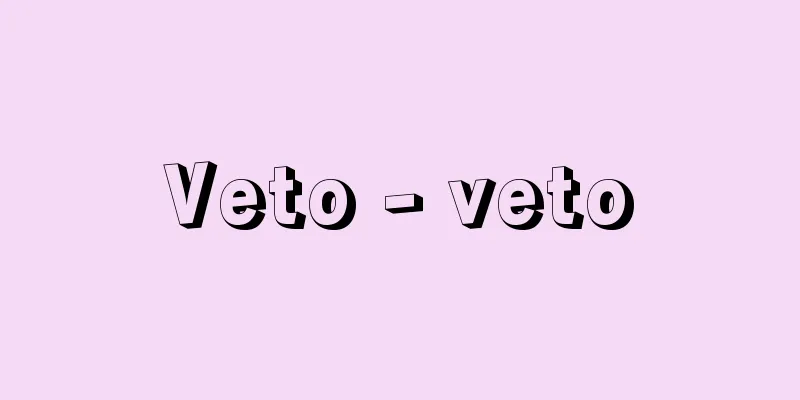Veto - veto

|
The power of one organ of a national or local government to prevent the passage of an act by another organ. This often occurs when the executive branch blocks the passage of a bill by the legislature. There is a distinction between a limited (or suspended) veto and an absolute veto. Under the United States Constitution, the President has the power to veto a bill passed by Congress, but if Congress passes the bill again with a two-thirds majority, the bill will become law as is. The British King has the power to completely block the passage of a bill by Congress, but according to constitutional practice, this has not been exercised since 1708. In Japan, the heads of local governments are granted a kind of limited veto power, which allows them to object to the enactment, amendment or repeal of local ordinances or budget resolutions of the local assembly and submit them for reconsideration (Local Autonomy Act, Article 176, Paragraphs 1 to 3). [Hisashi Uchida] Veto power under international lawThe power to prevent the passage of a resolution in international decision-making by the opposition of one country. Resolutions at international conferences and international organizations have traditionally been made under the rule of unanimity, based on the principle of sovereign equality of nations, and the general rule was that if even one country voted against the resolution, it would not pass, and all nations had the veto. However, as majority rule has gradually become the norm in international decision-making, today the veto has become an issue mainly in relation to the voting procedures of the UN Security Council. In other words, decisions on procedural matters in the Council are made by the affirmative vote of nine (seven before the amendment) of the 15 (11 before the amendment of the UN Charter in 1965) member states (UN Charter, Article 27, paragraph 2), while decisions on non-procedural matters are made by the affirmative vote of nine members, including the concurring vote of the permanent members (UN Charter, Article 27, paragraph 3). Therefore, if even one permanent member votes against a resolution, the resolution will not pass, and this is called the veto of the permanent members. A notable feature of this system is that only five major powers are granted the right to use the veto: China (representative powers changed from the Republic of China to the People's Republic of China in 1971), France, the United Kingdom, Russia (which succeeded the Soviet Union in 1991), and the United States. The term "veto" is used when looking at the issue in a negative light. However, originally it was recognized with the intention that great power unity was necessary out of practical considerations, since in important matters such as maintaining international peace and security, the permanent members could not be expected to assume the obligation to act in accordance with decisions they did not approve, and forcing a decision through despite this could lead to a major war. When the issue is viewed in a positive light, this is known as the principle of great power unity. However, according to the UN Charter, in decisions on the peaceful settlement of disputes under Chapter 6 and Article 52, paragraph 3, the parties to a dispute are compelled to abstain regardless of whether they are permanent members or not (Proviso, Article 27, paragraph 3), and voluntary abstention, absence, or non-participation in a vote by a permanent member is customarily treated as not constituting a veto. However, despite the introduction of such exceptional measures, the actual number of vetoes used has reached 261. By country, Russia has exercised the veto 124 times (including 119 times by the Soviet Union), the United States 82 times, the United Kingdom 32 times, France 18 times, and China 6 times (including 1 time by the Republic of China) (as of the end of 2008, according to a Global Policy Forum document). During the Cold War, the Soviet Union was particularly active, but with the relative decline of Western power following the expansion of the Council in 1965, the United States, the United Kingdom, and France began to exercise the veto more frequently, and since the end of the Cold War, the United States has been particularly active. However, overall, the number of times the veto has been exercised since the end of the Cold War has decreased. Despite the purpose of the system, the frequent use of the veto power has been seen as an impediment to UN activities, and there have been intermittent discussions within the UN since its inception about limiting or abolishing it. Since the end of the Cold War, the issue has often been discussed in relation to the expansion of the Council (increasing the number of permanent and non-permanent members), but because amendments to the Charter also require ratification by all permanent members (Articles 108 and 109, paragraph 2), reforming the veto power through formal amendments is not easy. [Hisashi Uchida] [Reference] | | |Source: Shogakukan Encyclopedia Nipponica About Encyclopedia Nipponica Information | Legend |
|
国家または地方公共団体の一機関が他の機関の行為の成立を阻止する権能。立法府による法案の成立を行政府が阻止する形で問題となることが多い。制限的(または停止的)拒否権と絶対的拒否権の区別がある。アメリカ合衆国憲法上、大統領は連邦議会を通過した法案を拒否する権能を有するが、議会がふたたび3分の2の多数で可決すれば法案はそのまま成立するのは前者の例であり、イギリス国王が議会の法案の成立を完全に阻止する権能を有するのは後者の例であるが、憲法慣例によれば1708年以来行使されていない。 日本では、地方公共団体の長に対して、地方議会の条例の制定改廃または予算の議決に異議を唱え、再議に付するという、一種の制限的拒否権を認めている(地方自治法176条1~3項)。 [内田久司] 国際法上の拒否権国際的意思決定において1国の反対により決議の成立を阻止する権能をいう。国際会議や国際組織の決議は、国家の主権平等原則を基礎に、伝統的に全会一致規則の下に行われ、そこで、1国でも反対投票をすれば決議は成立せず、すべての国が拒否権を有するというのが一般原則であった。しかし、国際的意思決定においてもしだいに多数決が原則化するなかで、今日、拒否権は主として国連安全保障理事会の表決手続に関して問題となっている。すなわち、同理事会の手続事項に関する決定は15(1965年の国連憲章改正前は11)理事国中、9(改正前は7)理事国の賛成投票により行われるのに対し(国連憲章27条2項)、非手続事項に関する決定は「常任理事国の同意投票を含む」9理事国の賛成投票によって行われる(同27条3項)。したがって、常任理事国が1国でも反対投票すれば決議は成立せず、そこでこれを常任理事国の拒否権という。ここでは、中国(1971年中華民国から中華人民共和国へ代表権交代)、フランス、イギリス、ロシア(1991年ソ連を継承)およびアメリカの五大国にのみ拒否権を認めている点に特色がある。拒否権は、こうして問題を消極的にみた場合の呼称である。しかし元来は、国際平和と安全の維持のような重要事項において、自ら賛成しなかった決定に従い行動する義務を常任理事国が負担することは期待できず、それを押し切って決定を強行すれば大戦を引き起こしかねないという実際的考慮から、大国一致が必要であるという趣旨で認められたものである。こうして問題を積極的にみた場合、これを大国一致の原則という。 もっとも、国連憲章によれば第6章および第52条3項の下での紛争の平和的解決に関する決定では、紛争当事国は常任理事国であるか否かを問わず棄権を強制されるほか(27条3項但書)、常任理事国の自発的棄権、欠席または投票不参加は、慣行上、拒否権を構成しないこととして扱われるなどの緩和策が講じられている。しかし、このような例外措置が導入されてはいるものの、実際の拒否権行使は261回に上っている。国別ではロシア124回(うちソ連119回)、アメリカ82回、イギリス32回、フランス18回、中国6回(うち中華民国1回)である(2008年末。Global Policy Forumの資料による)。冷戦期にはソ連の行使が突出していたが、1965年同理事会の拡大に伴う西側勢力の相対的減退を背景にアメリカ、イギリスおよびフランスによる行使が増え始め、冷戦終結後はとくにアメリカの行使が目だっている。しかし全体として、冷戦終結後の拒否権行使の回数は減少している。 制度の趣旨にもかかわらず、拒否権の頻繁な行使は、国連活動の障害になっているとして、国連内でも発足以来断続的にその制限ないし廃止が論議の対象となってきた。冷戦終結後は同理事会の拡大(常任・非常任理事国の増員)問題との関連で議論されることが多いが、同憲章の改正にも全常任理事国の批准が必要とされるので(108条、109条2項)、正規の改正による拒否権改革は容易ではない。 [内田久司] [参照項目] | | |出典 小学館 日本大百科全書(ニッポニカ)日本大百科全書(ニッポニカ)について 情報 | 凡例 |
Recommend
Command - Command
A tool carried by generals and other commanders t...
Base level of erosion
...If no new relief is produced by internal proce...
Coefficient - keisuu (English spelling)
(1) Coefficients of monomials In the monomial 3 ax...
Carbonara (Italian)
A type of spaghetti dish. Boiled spaghetti is topp...
Hyuga Nada
The area offshore from the coast of Miyazaki Pref...
Victorianism
…One of the notable features of British society d...
National broadcasting - kokueihoso (English spelling)
Broadcasting managed and operated by the state its...
World view - Sekaikan (English) world view English
Generally speaking, it refers to a holistic under...
ethologie (English spelling) ethologie
...This definition of Haeckel lacks the "hab...
Musée d'Orsay (English)
...In addition to the existing collection, the Lo...
《The gods never die》
…After graduating from the École Normale Supérieu...
Heat transfer
A general term for the process of spatial energy t...
SI (medicine) - SI
...It is a chemotherapy agent against bacteria an...
Dorchester
Dorset is the capital of the county of Dorset in t...
Ichiyo
→ Toyo Source : Heibonsha Encyclopedia About MyPed...









